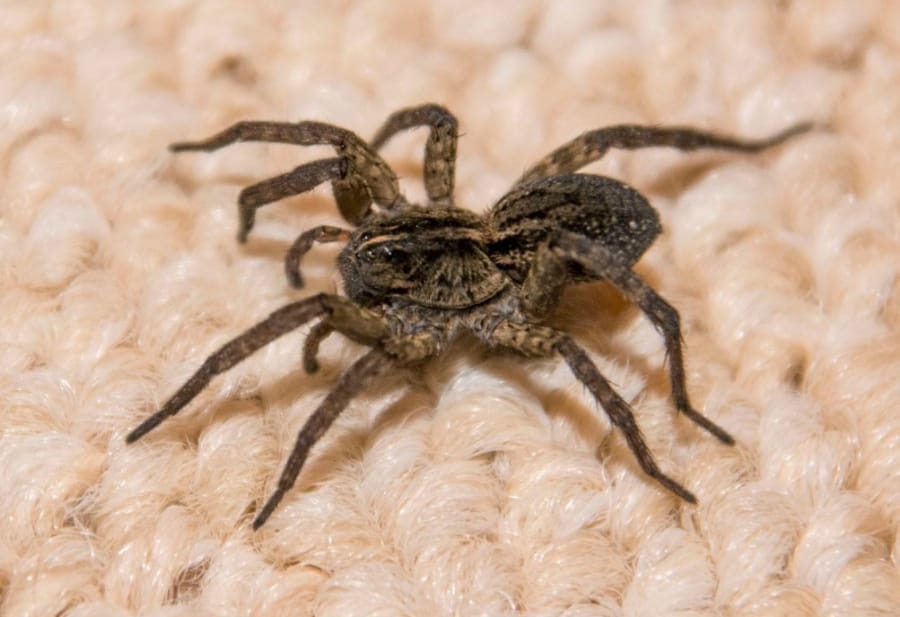WASHINGTON — You’re enjoying dinner with your family when a spider the size of a half-dollar races across the floor and under the table. Even more terrifying — you wake in the middle of the night to find a large, hairy spider sharing your bed. Worse yet, it’s resting on your neck.
The demonlike arachnids invading our homes this time of year are wolf spiders, but they are not as threatening as they appear. They are mostly harmless to humans but are feared because of their large size and their fierce namesake. They bite only when provoked but are not aggressive. They actually are quite shy.
Just like stink bugs and spider crickets, wolf spiders are accidental intruders in homes. As summer transitions to autumn, cooling temperatures prompt them to seek cover and find mates, which ultimately leads them to discover cracks and holes in homes. A common entry point for the spider is under doors.
In the Washington, D.C. region, wolf spiders grow from one to three inches in length, including their legs, but the Carolina wolf spider can span more than four inches with its legs. They don’t spin webs but instead run down or ambush their prey.
They have eight eyes, eight hairy legs and two sharp fangs that inject a mild venom — nonlethal to humans, although the bite may cause swelling or a slight fever, comparable to a wasp sting.
Wolf spiders are the only spiders known to carry their spiderlings. A mother spider can have more than 100 babies clinging to her abdomen. If the mother is disturbed, however, the babies often flee in all directions.
The best way to keep wolf spiders out of your home is to caulk cracks and holes in the foundation and outer walls, and to add weather stripping to doors and windows. Spraying insecticides around the outside of a house can create a barrier for spiders, but chemical barriers are less effective than physical barriers because they wash away if they aren’t reapplied frequently. Mixing a few drops of pure peppermint oil, which can repel spiders, with water and spraying the mixture indoors (kitchens, bathrooms, bedrooms and other areas you’d prefer to be spider-free) could also be effective. A citrus oil mixture might also work if you’re not a fan of peppermint.
Like many of us, I have a horror story involving the wolf spider. I was weed-whacking in late September along the front of my house when I spotted what I would classify as a giant specimen on the brick at grass level.
Before I knew it, the weed whacker hit the spider, which instantaneously exploded. Wolf spider bits sprayed everywhere, including into my face.
I polled my friends on Facebook to find out how many have encountered this oversized spider. I quickly learned that many of them have interesting and creepy wolf spider stories. Here are a few of the stories I received, lightly edited:
• “I woke up in the night and discovered a giant wolf spider was on my neck. I grabbed it with my hand and threw it across the room. It was a gut reaction. The spider was so heavy I heard it hit the wall with a thud! The next morning, I found it and vacuumed it up,” wrote Elizabeth Cobb of Casanova, Va.
• “Back in my younger days, when I was at Goshen Boy Scout camp, I was lying on my cot inside the tent and I saw a big wolf spider directly above me on the tent wall. I swatted at it and the spider fell down on me with all its babies, which seemed like hundreds of them. I cannot remember how many times I was bitten but I know I was sick for three days from it,” wrote Spencer Marker of Centreville, Va.
Others had a more level, rational take on the wolf spider, which arachnologists would be quick to point out, are harmless. In fact, they can be beneficial, eating up all the other bugs in your home.
• “We have a ton of wolf spiders here. I won’t kill them; I catch and release them. I put a cup over them then slide a piece of paper or cardboard under the cup and carry them outside,” wrote Terry Mayer, Pinehurst, N.C.
• “I like to escort wolf spiders out of my house. I hate killing things unless it stings, or it’s a fly or gnat,” wrote Prudence Justis of Richmond, Va.
During the past two weeks, I’ve captured about 25 wolf spiders in my house.



